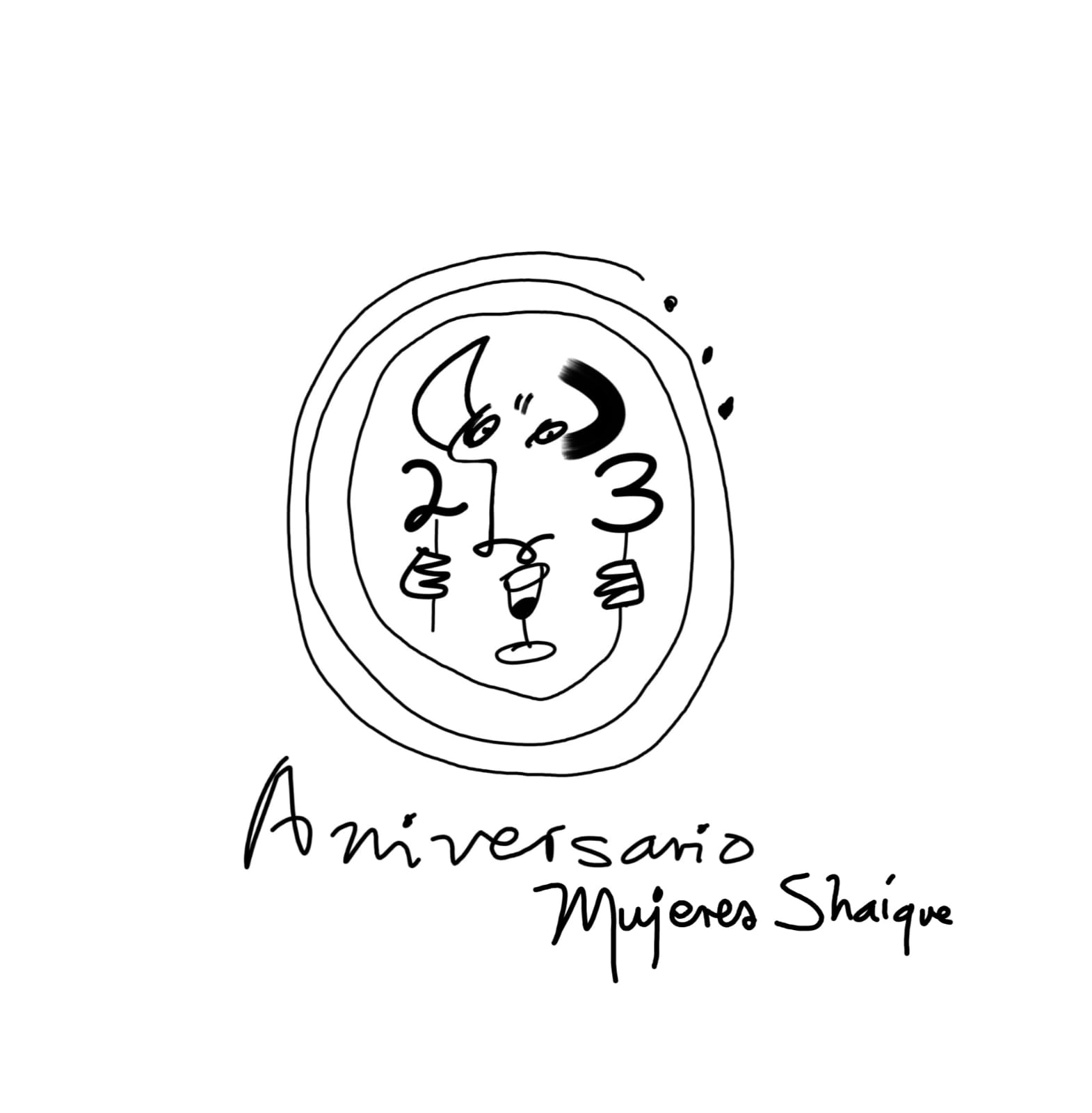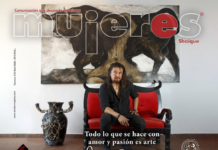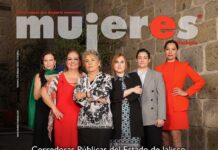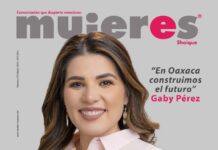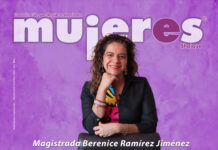Karla MARTINEZ DE AGUILAR
Photos: Jorge Luis Plata
Dress: Dacanni
Translation by Angie Santillana e Irasema Multilingual Communications Consulting, LLC
The group 50+1 Nacional, comprising women politicians, academics, activists, and specialists, served as the liaison with Irasema González Vargas. Irasema, a Mexican migrant who has resided in the United States for 30 years, works as a language consultant for the U.S. government. Her life story and professional journey serve as a source of inspiration and a shining example of how to unlock our potential despite challenging circumstances.
You migrated to the US when you were pretty young; why did you decide to leave your family and country behind?
My main reason was the painful experience of being a sexual abuse victim when I was five. I migrated when I was 18 without speaking the language. It was interesting and challenging because I never practiced the little English I learned in Mexico, so I had to communicate with signs most of the time.
I have been living in the US for over 30 years, and I was lucky enough to receive support to work and start to heal the painful experiences in my life. In 2008, with the generous support of the Coca-Cola-Goizueta full scholarship, I earned my Bachelor of Arts in Communications with a minor in Politics from Oglethorpe University.
Having had the opportunity to study and speak a different language equipped me with the tools to climb the ladder and extend a helping hand to others.

In hindsight, having had the opportunity to experience life from “the other side” as it is popularly referred to, how do you see the issue of sexual abuse?
It is a complicated issue in Mexico. In my personal journey, I carried the burden of pain in silence for many years due to the overwhelming trauma and the fear that speaking out would jeopardize the safety of my family. It was not until I reached the age of 25 that I found the courage to confide in my parents about what had happened to me.
This radically changed when I got to the US. On one hand, I had the care of a family that allowed me to feel empowered and grew my self-esteem. On the other hand, the school did its thing, and both psychologists and the American people made me feel like one of their own. These were the three main pillars for me. I am confident now to tell my story, and there is quite a good amount of support in the US for these kinds of situations.
During that era in Mexico (I am not entirely sure I can recall the exact time because my mind blocked that), discussing sexual abuse was often considered taboo, leading to a lack of real support for individuals facing such traumatic experiences as mine. Despite more support on those topics nowadays, it is not enough for someone who went through all that to talk about it and look for help.
The episode of sexual abuse you experienced, is it something you overcame or coped with?
Both. You overcome it because, despite everything, you have the same body and soul. You have to overcome it to keep living your life. You cope with it as well. Although you might forgive, you will not forget. These are deep scars, and sometimes, some situations trigger the feelings from that episode.
For instance, when I come to Mexico, I do so out of fear. I have been carrying these feelings since I was a child; they are a defense mechanism.
Given the significant impact of this experience on your life, how do you aim to contribute to society to prevent similar cases from occurring in the future?
I tell my story to empower people to tell theirs. I aim to break the taboo of not speaking about it. To do so, one would need professional help like me. I had counselors, mentors, a psychiatrist, and the help of my American family who helped me recover and grow my self-esteem. That is how I am becoming an example for people with the same experience.
Presently, I serve as a linguistic advisor to some U.S. government agencies and organizations committed to safeguarding children, families, migrants, and humanity as a whole. I look to create relationships to bring vulnerable sectors the support needed.
How did you start working for the U.S. government?
It all came about because I always wanted to work in defense of children because of what happened to me, and obviously, I did not want it to happen to anyone else.
Life led me through various professional paths until I reached my current position. From a psychological perspective, I decided to work at the government because, based on my past experiences, I believed they would provide a level of protection and security that others could not offer. I have been here for eight years now.
After being able to verbalize the difficult episode in your life, what was it like to return to Mexico, and how do you cope with the stories you hear from so many immigrant children and families?
The most challenging aspect was that after finding the courage to speak out about that painful episode of my life in the U.S., I returned to Mexico only to discover that under their laws, after a certain number of years, the crime was considered time-barred, and there was no legal recourse available. I found it difficult to comprehend why the law operated in such a way (although now I understand that there are laws that do not prescribe crimes), and I could not help but take it personally. Consequently, I decided to return to the U.S. without any desire to return to my homeland, as I felt that Mexico could not offer me the safety and security I sought.
Because of my background in executive and life coaching, I am able to cope with many of the stories I encounter. In my practice, I prioritize mental health and wellness, making them central to my techniques. This focus has equipped me with filters that enable me to process information effectively and assist myself and others in overcoming the complex challenges that life throws our way.
It is incredibly challenging to witness children who are alone and marginalized in a foreign country, unable to communicate in English or Spanish because they only know their native language. Unfortunately, interpreters are not always readily available in these situations. These children wait to be picked up by family members in places where, despite the rumors, they are indeed protected, although access to these areas is restricted even for the media. Through my coaching training, I strive to transform the life stories of these children into something that shines brightly, something that radiates light. I recall the support and care I received when I came to the USA, and it is that empathy and understanding that I endeavor to extend to them.

What do you think about the discussion about immigration laws between Mexico and the U.S., as they are both part of you?
It is indeed challenging because I see myself as belonging to both places. One gave me life, while the other provided the vital support I needed to excel and move beyond my history of pain.
From my perspective, encompassing both sides of my experience, I passionately believe that human rights should be respected universally, regardless of location or circumstance. Fortunately, in my workplace, I witness a commitment to respecting immigrants’ rights, which contrasts with the portrayal often seen and heard in the media. For instance, the children in our care are provided with comprehensive support to ensure they lack nothing and are as comfortable as possible. Our priority is to locate their families in the U.S. or, when necessary, to guide them to places where they will receive the protection they need.
Speaking from my Mexican perspective, it is crucial to ensure the rights of immigrants are protected, given the numerous instances of abuse they have faced.
It is an incredibly complex issue because without adequate preparation and empathy, one risks inadvertently harming the very people one is striving to assist.
So, the U.S. is not Mexico’s enemy?
No. And I can affirm this because I live there. Absolutely, having policies that are not always compatible does not imply enmity between countries.
They have often portrayed the U.S. as the villain in the story, but from what I have seen, Americans treat Mexicans very well. That is not the reality they depict. In one of the projects I managed, I ensured that the food provided to the children was plentiful and high-quality. I had to replace the processed milk they were given because it did not suit them well, as they were unaccustomed to drinking it.
The U.S. is careful in details as small as this, which Mexico does not notice.
Mention three influential points or people in your life.
Firstly, my Mexican parents, Hector and Maria del Carmen. They have been my drive and inspiration; they work so hard for my brother and me.
Secondly, the protection that the U.S. gave me allowed me to reach great heights without ever forgetting my Mexican heritage. I remain proud of my identity and the deep love I hold for my country. This shelter was extended to me despite my not being flawless in English. This contradicts the notion that Americans reject Mexicans based on their pronunciation of the language.
Thirdly, I had the honor of being invited to listen to the address of Barack Obama, former President of the United States, on Capitol Hill in Washington D. C. It was a remarkable experience to hear his speech firsthand.
Has your commitment, as both a woman and a professional, transformed into being synonymous with the fight for human rights?
Yes. I have always known that was my path. I am now focused on intensifying my efforts to support children in verbalizing difficult situations, like the one I experienced, from the moment it occurs to them.
I am also focused on my job with the government, where I have the chance to work on health matters, human rights, childhood defense, and collaboration with other government agencies.
Do you deem yourself lucky despite the traumatic experience you went through?
Yes. Some may criticize what I am about to say, but I believe that if I went through what I did, it is because God intended for me to do something to help children who endure similar hardships. My work has helped me find peace and tranquility and no longer live with sadness. It has become a source of great strength for me to keep moving forward.
Anything else you would like to say?
I want to express my gratitude for allowing me to share my story. This year, I turned 45 years old, and as a gift to myself, I visited Oaxaca, fulfilling one of my lifelong dreams. During my visit, I had the chance to model traditional dresses, immerse myself in their culture, and support women entrepreneurs. It was a truly enriching experience. I am committed to continuing to find ways to help people excel and access opportunities, just as I have been fortunate enough to do. With my consultancy, Irasema Multilingual Communications Consulting, LLC, I aim to create a support network for those in need and serve as a catalyst for positive change in our communities.


